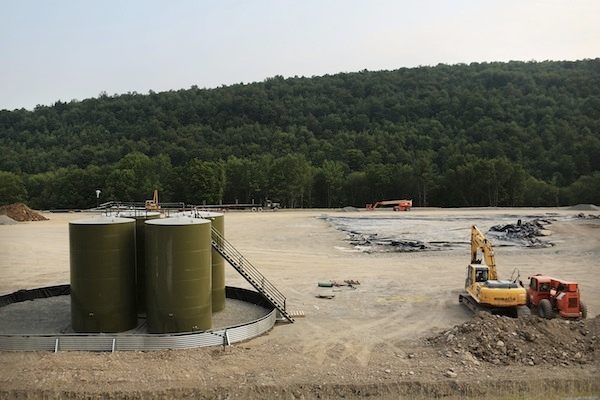In all the noise of tomorrow’s Budget, many may not spot a small tweak to the fiscal regime for UK oil and gas. Those of us with a close interest in unconventional oil and gas, however, will be watching closely. Last year the Chancellor announced a consultation on a specific tax regime for onshore shale gas development, the results of which are expected on Wednesday.
Press coverage of shale gas is often characterised by myth and hyperbole. For some, it’s the last gasp for fossil fuels; for others, a new source of energy security and the key to bringing down bills for industry and consumers.
We are not used to thinking of energy as a diplomatic weapon here, but contrast this with the EU which imports a fifth of its gas from Russia via Ukrainian pipelines. Several times in recent years, Russian gas giant Gazprom cut or threatened to cut Ukrainian supplies. On each occasion the impact reverberated across mainland Europe. However, as a result of the US shale gas boom, some analysts now expect lower LNG prices to reduce Europe’s exposure to Russian gas from 27 per cent of supply in 2009 to just 13 per cent by 2040. That’s without significant domestic European shale gas production. With estimates of European shale gas reserves rising, the impact here could be even greater. Earlier this year, for example, Shell signed a 50-year, $10 billion deal to develop reserves in Ukraine. All of this could mean massively reduced reliance on Russian gas and hugely improved security of supply for mainland Europe. It could also have a significant impact on the Russian economy, where oil and gas revenues reached a record $346 billion in 2011.
This fundamental shift in energy patterns goes far beyond Europe. According to the International Energy Agency, America will overtake Russian gas and Saudi Arabian oil production by 2017. In just two decades, the US could be a net oil exporter, virtually self sufficient in energy. China (which some analysts believe has larger potentially recoverable shale gas reserves than the US) has embarked on a technology buying spree, investing tens of billions of dollars in the Canadian oil and gas sector. Australia, South Africa, Argentina, Brazil and Mexico, among others, are all believed to have large deposits.
We could be moving towards a world where fossil fuel resources are no longer concentrated in a small number of (often troubled) regions, transported around the world via vulnerable choke points such as the Straits of Hormuz. Instead, decentralised unconventional oil and gas deposits could reduce long term global supply risks and help prevent the energy shocks and oil price spikes of past decades. It’s no wonder Fatih Birol, chief IEA economist, believes unconventional gas has the potential to change the entire global energy supply structure.
Back here in the UK, the shale gas debate is just taking off and there are important questions to answer before we can grasp the full domestic impact. But with UK shale gas estimates being revised significantly upwards, it is a debate we cannot ignore. PWC recently suggested that shale oil production could boost UK GDP by 2 per cent (or £30 to £50 billion). If these estimates are even close to accurate, one can appreciate the Treasury’s interest in encouraging the fledgling UK industry with a favourable tax regime on Wednesday.
It’s not just about tax breaks though. If the figures add up as predicted, this industry will stand on its own feet economically. The industry must also earn a ‘social licence to operate’ from communities living in parts of the country which might contain significant shale gas reserves. This will come from full and open consultation, safe and responsible working practices and a system to ensure that economic benefits are shared by host communities. Tax breaks or not, if the industry cannot gain the support of local communities, it is unlikely to succeed. Cuadrilla’s recent decision to halt exploration in order to conduct further community consultation and environmental impact assessments is heartening evidence that we are headed in the right direction, learning valuable lessons from the US experience. The new Office of Unconventional Gas and Oil and the All Party Parliamentary Group that I chair will both play a role in promoting robust environmental and safety regulations. With decades of oil and gas experience behind us, I believe the UK can set a world leading standard for this industry.
Some believe that international climate change agreements are failing to provide the necessary framework required to keep global emissions at manageable levels, and fear (perhaps justifiably) that developing unconventional oil and gas could worsen this situation. In reality fossil fuels will remain the backbone of global energy production for the foreseeable future, whether we like it or not. If shale gas displaces nuclear or renewable energy investment, then the world will have a problem. But with countries like China, Australia and India (three of the largest global coal consumers) eager to develop domestic shale gas resources, we also have an opportunity. Replacing coal with gas has dramatically reduced US carbon emissions in recent years. A similar outcome in other coal using countries could mean substantial medium-term CO2 savings. It’s not the end solution, but it’s a step in the right direction.
Even if the UK fails to exploit its own resources, the globalised economy means changing energy markets will affect us anyway. We cannot and should not isolate ourselves from this potential global energy revolution.
Dan Byles MP is Chair of the All Party Parliamentary Group for Unconventional Oil & Gas and is a member of the Energy & Climate Change Select Committee.






Comments